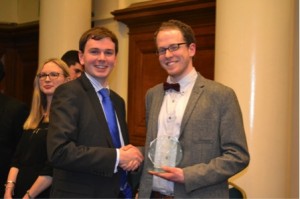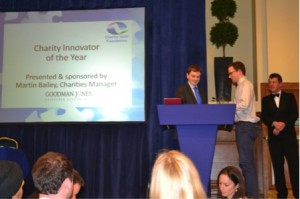What’s changing
 October marked the start of a new and exciting chapter for Goodman Jones: saying goodbye to our home in Fitzroy Square and moving to Arthur Stanley House.
October marked the start of a new and exciting chapter for Goodman Jones: saying goodbye to our home in Fitzroy Square and moving to Arthur Stanley House.
This strategic move, which comes in the year we celebrate our 90th anniversary, marks a significant milestone in our commitment to creating a modern environment that fosters collaboration and creativity, and we see it as the ideal platform for the next phase of Goodman Jones’ future.
Inclusivity
Our new space at Arthur Stanley House has been carefully designed to foster an inclusive work environment that reflects the diverse ways our team engages and collaborates. We understand that the traditional one-size-fits-all office layout no longer meets the needs of a modern workforce and, with this in mind, have introduced various zones to accommodate different styles of work, ensuring all team members are able to perform to their best.
The building is equipped with multiple collaborative spaces that encourage teamwork, alongside private zones for focused, individual work. Additionally, the space includes accessible facilities, ensuring that everyone can comfortably navigate the office. This flexibility is not only intended to enhance productivity but also to ensure that the workspace is inclusive and adaptable to various needs and working preferences.
Sustainability
Another key principle behind our move was sustainability. Arthur Stanley House, designed by AHMM, is built to best-in-class environmental standards and has earned a BREEAM Excellent rating, signifying its commitment to energy efficiency and minimising environmental impact.
Originally constructed in the 1960s as part of the Middlesex Hospital estate, the building has undergone a complete transformation. It now boasts a range of high-tech features and innovative materials, such as triple glazing, solar panels and natural ventilation systems. These upgrades ensure that the building is both forward-thinking and environmentally responsible, reflected in its EPC A rating.
What’s staying the same
Client Service
This remains an absolutely core principle and one that we are always seeking to evolve and improve. We have planned the new office to facilitate communication and collaboration across the whole team, all with the goal of improving efficiency as well as the quality of the service we provide.
People & Talent
At the heart of any people-focused business should be a commitment to helping talent reach its full potential. This is another of our core values, and again, our new office will help us do better still. The open-plan space will give trainees a better learning environment, exposing them to how the business operates as a whole, while giving them easy access to senior members of the team for guidance and advice.
Independence
As you may be aware, the accountancy world is changing fast, in large part due to the rise of private equity models. But despite these shifts, we’re committed to maintaining our independence, believing this approach best serves the long-term interests of both our people and our clients. In Managing Partner Julian Flitter’s words: “being independent lets us prioritise what’s always been most important to us: building strong relationships, providing a tailored service of the highest quality, and creating a supportive environment for our team.”
The information in this article was correct at the date it was first published.
However it is of a generic nature and cannot constitute advice. Specific advice should be sought before any action taken.
If you would like to discuss how this applies to you, we would be delighted to talk to you. Please make contact with the author on the details shown below.
















